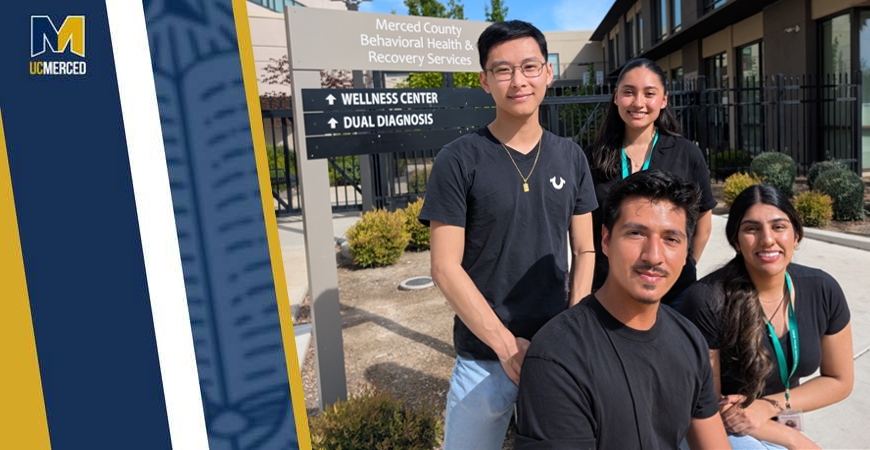
UC Merced students are getting first-hand experience in providing mental health care to the most vulnerable and needful among us, thanks to a partnership between the university and Merced County.
Undergraduate psychology majors are serving as interns at the county’s Department of Behavioral Health and Recovery Services, which works with other agencies to offer a system of care for people living with mental illness or substance abuse disorders.
The internship program launched in 2022 in response to California’s shortage of behavioral health professionals. Interns work directly with clients and are mentored by professionals.
These face-to-face experiences with people grappling with any combination of addiction, abuse, hunger and homelessness give the students a clear-eyed view of what a career in mental health care could be like.
Special Event: UC Merced and Merced County Behavioral Health and Recovery Services will host a career fair 10 a.m. to 2 p.m. Tuesday, April 22, at the university Conference Center. Students can learn about opportunities for internships, employment and graduate school in the field of mental and behavioral health.
This real-world training also makes the students more attractive candidates for graduate-level studies and research, along with careers in mental health care, social work or marriage and family therapy. A central goal of the state grant was to increase the number of professionals in mental and social care.
Many of the students in UC Merced internship program are from the San Joaquin Valley and expressed a desire to give back to their communities.
“To become a clinical psychologist or a psychiatrist, you must have hands-on, real-life experience before you can get into graduate school,” psychology Professor Jennifer Hahn-Holbrook.
She teaches a course aligned with the internship that covers scientifically supported clinical practices, along and strategies for working with underserved communities. Alexander Khislavsky, a former UC Merced psychology professor, provides invaluable support to Hahn-Holbrook and the interns.
“The state targeted high schools, colleges and graduate programs to catch people who might be interested in mental health services so they can be someone’s health worker or counselor four or five years down the line,” Hahn-Holbrook said.
Through the fall 2024 semester, the program had six paid interns per term. Funding from a state grant ended in December 2024. The current semester has four interns; all parties involved agreed they could work as volunteers. As before, the students receive course credit. The university is looking for new sources of financial support.
Hahn-Holbrook said four out of five students who have passed through the program were accepted by clinical psychology graduate programs and most of the rest are working in the mental health field.
Former interns include Jaydah-Zo Aguilar, who is employed at BHRS as a peer support specialist. She will receive a bachelor’s degree in psychology in May. “The internship provided many opportunities and I’ve always had a passion to help others,” she said.
Geovanni Angelica graduated in spring 2024 with a double major in psychology and philosophy. He is employed at BHRS, working with children and teenagers who struggle with substance abuse. Angelica said the internship showed him the effort required to spread awareness about mental health services.
All four of this semester’s interns are set to graduate in May.
Chandler Tien works with a team that visits adult clients at home or on the street. The workers strive to maintain a connection, to understand clients’ needs, and to coax them to visit the county’s Wellness Center or join a support group.
“Working at BHRS has shifted my focus from marriage and family therapy and social work because of the outreach and social justice aspects,” said Tien, a native of San Francisco.
Interns Simran Randhawa and Luis Guevara work in outpatient services for children and teenagers. Like the services provided to adults, the unit draws on agencies inside and outside the county government, covering everything from therapy to housing to food.
Randhawa, a native of Turlock, said the internship strengthened her determination to become a clinical psychologist. “It opened paths to the community I grew up in and helped me see what my community needs,” she said.
Guevara, who is from Madera County, said the internship strengthened his plan to pursue clinical psychology research next fall at California State University, Northridge. “I wanted to go into clinical practice to see what is actually working for children in smaller, rural communities,” he said.
The fourth intern, like Tien, is from San Francisco. Sianna Martinez works in a BHRS unit that provides treatment and recovery services for drug users aged 12 to 17. The program includes counseling, life skills development and support against relapses.
Tien and Martinez both plan to return to San Francisco to pursue master’s degrees and continue working in behavioral health. Martinez said they would probably focus on LGBTQ+ youth. “Growing up queer in San Francisco, I know that community,” they said. “I would like to give something back.”
All of the interns said the experience goes beyond rules and best practices. Interacting closely with people – young ones, in many cases – struggling to stay afloat mentally, physically and socially can wear on you.
Martinez recalled a teenage girl in a drug relapse-prevention group they led who was easy to talk to. They developed a rapport. Then, near the end of the program, the girl relapsed. She repeated this pattern several times.
“Since I was able to be closer to this client, it was hard,” Martinez said. “I just tried to be patient and guide them through. It reinforced that healing isn’t linear.”
Tien, who has done two BHRS internships, remembered an early experience when a girl with a history of self-harm arrived for a therapy session with fresh cut marks. “I had to step back and let the professionals work their magic.”
Balancing compassion with professionalism and a measure of emotional removal is a big part of the job.
“We could take home a lot of things our clients tell us. Siana sees people relapse. Luis, Simran and I see people who have been abused,” Tien said. “That’s why we’ve been told by our supervisors and our professors to leave work at work.”
As much as the UC Merced interns have learned from the county professionals and about themselves, they have given back to the agency in a special way.
“They remind a lot of us about why we got into the field because they bring that hope and sparkle and shine,” said Program Coordinator Jill Kojima, who heads the internship effort for BHRS. “For them to be able to have their life-changing ‘a-ha’ moments with us is really amazing.”




 Public Information Officer
Public Information Officer

